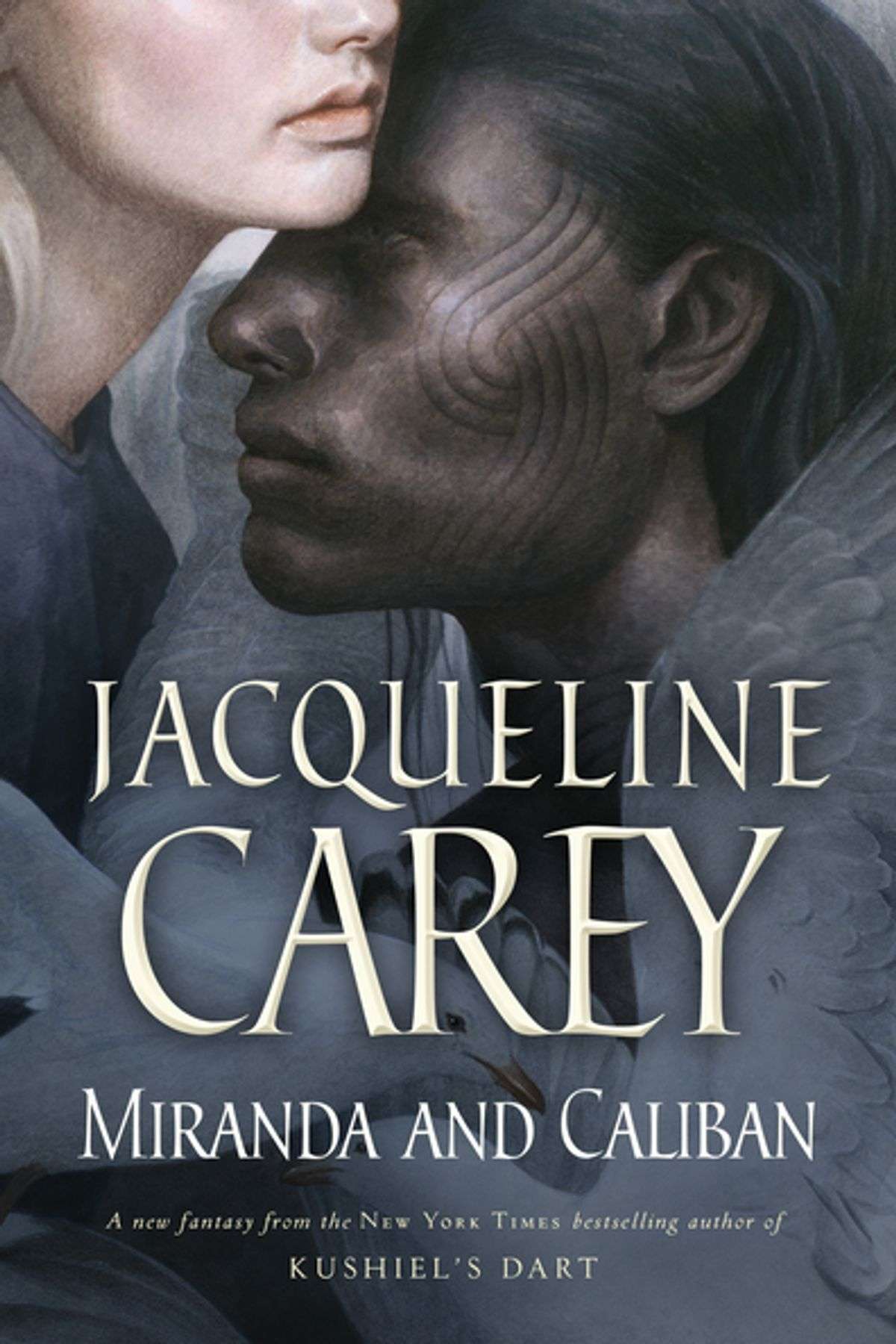Miranda and Caliban, by Jacqueline Carey
As a student of Shakespeare, I became familiar with the incredible complexity of many of the Bard’s characters, enlivened by diverse and imaginative interpretations. But some characters are problematic; inchoate, yet peevish if over-analyzed. Ophelia, for example, or Jaques in As You Like It. For me, no character defies yet begs for better representation than The Tempest‘s mooncalf, Caliban. Written as a monster, his occasional grand speeches are confounding – Shakespeare was not kind to Caliban, and trying to push him into a nobler mien merely saddles him with trite embellishments.

Thank heavens that Jacqueline Carey has no such constraints, and is able to give us a story of not only a more nuanced Caliban, but also a Miranda that goes beyond an archetype of female virtue, as she is too often portrayed.
In Miranda and Caliban, Ms. Carey spins the lovely tale of two exiled youngsters – one, an unwitting princess, the other, the spawn of a dark, savage witch – who nevertheless grow close. Other than the authoritative sorcerer Prospero (who Miranda only knows as “Papa” and Caliban only as “Master”), they are each other’s sole human companions on the small island that is their world. Yet their friendship is not contrived; each benefits from the other, physically and emotionally. Told in alternating points of view, Miranda is a kind teacher to feral Caliban, countering the cruelty that her impatient father would inflict on him; he is her protector from danger and from loneliness. Complications arise, however, as they grow older and their feelings shift from innocent friendship to benighted love. By the time Ms. Carey’s novel catches up with Shakespeare’s play, our hearts are ready for what we know must happen, but it doesn’t keep our hearts from breaking.
I can think of no better writer to undertake this story than Jacqueline Carey. In her various Kushiel Legacy series, she has garnered a well justified reputation for crafting opulent historical fantasy and mastering mannered yet unencumbered prose, and her beautifully rendered duology, The Sundering, verifies her ability to impart the antithesis of established epic themes. In Miranda and Caliban, she is able to take Shakespeare’s tale and imagine what the characters may have been like far earlier than when the Bard gave voice to them.
But mostly, she is able to humanize both characters. Her Miranda and Caliban are youngsters whose world is peopled with sylphs, undines, gnomes and other elementals. It is a place of spirits and magic, where the only adult is an austere sorcerer, caught up in his own plans of retribution. Prospero certainly loves Miranda, but he does not understand her (nor does he see a need to), and Caliban is merely a crude means to an end. Is it any wonder that the lonely girl and the outcast boy form such a simple, legitimate bond?
Ms. Carey gives these children an innocence, a purity, that is marred only by Prospero’s unyielding expectations and Ariel’s interference. She does not turn a blind eye to Caliban’s bestial nature, his coarse appearance, his imperfect understanding of civilization, but in Miranda’s guileless eyes, they merely manifest as part and parcel of who he is, without outside judgment save that of her father’s, with which she increasingly disagrees. As the children mature, Ms. Carey is able to turn their friendship into a longing that is both physically genuine and bewildering. Yes, there are conflicts, but they are never contrived nor cloying, and end up dovetailing effortlessly with Shakespeare’s creations toward the end of the book.
Although Miranda and Caliban are the major players in this novel, Ms. Carey does not ignore the other leads: Prospero and the rescued spirit, Ariel. Each are given their own unique styling, divergent from that of Shakespeare, yet not so different as to feel foreign.
Prospero, for all his severity and insensitivity, is not a completely callus monster. He truly wants the best for Miranda; he simply is blinded by his intense focus on a manipulation of the arcane arts. Yes, we can fault him for that. Yet Prospero is a man who has been sorely used and betrayed, and we come to realize that he, too, is a creature of his own environment.
Ariel, the spirit bound to Prospero, is also played against type; despite his established ethereal beauty and refined speech, in Ms. Carey’s novel he is meddlesome and often a malicious manipulator rather than an acquiescent sprite pining for release. While we can have sympathy for his plight, if there is any villain in this tale, Ariel would win out due to his cruelty towards both Caliban and Miranda even if it is Prospero whose shortsightedness causes the most damage.
Regardless of your knowledge of Shakespeare, Miranda and Caliban is a lovely work, written by one of our time’s great masters of fantasy. In this day and age where appearance has come to be held in such high regard, this novel stands as a testament to the power of unfettered friendship, even as it entertains our senses and piques our emotions. Once again, Jacqueline Carey has crafted a work to treasure. I think the Bard would have approved.
—Sharon Browning

